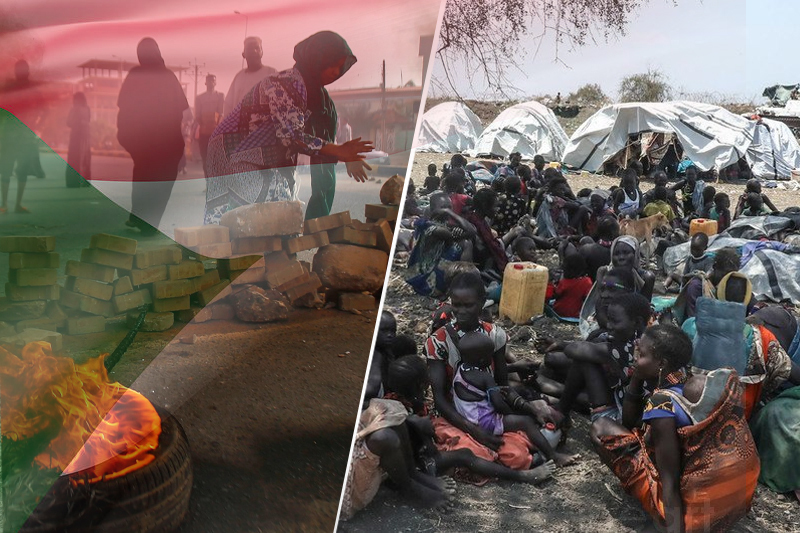
death, terror, fear of losing home… all in the air of sudan’s humanitarian crisis
Khartoum: As violence in Sudan between rival forces continues and civilian casualties rise, Germain Mwehu has received nonstop calls from people in need.
In Khartoum, Mwehu works for the International Committee of the Red Cross (ICRC).
A Khartoum University student wrote to Mwehu pleading for help to return home. The young woman had been stranded at the university since Saturday when the conflict broke out.
“But we can’t do anything,” Mwehu told a reputable news outlet.
“We can’t move, we can’t go out,” he insisted, adding that the university lies close to the army’s headquarters, where fighting is common.
As fighting between Sudan’s army and the paramilitary Rapid Support Forces (RSF) continues for a fifth day, humanitarian organizations find themselves in a deadlock.
According to the United Nations, 185 people have been killed and 1,800 injured.
Despite this, the death toll is likely to be higher due to aerial bombardment of airports, homes, hospitals, and power stations.
A looming refugee crisis could result in a country that already hosts refugees and internally displaced people (IDPs), and is a neighbor to other nations also afflicted by conflict.
At the moment, the International Rescue Committee (IRC) does not anticipate a movement of people outside Sudan.
“I don’t expect just a massive movement of refugees outside Sudan, because the conflict is so localized in Khartoum and Darfur now,” Eatizaz Yousif says.
According to her, the IRC is already seeing internal displacement from those two states to safer states.
Other organizations are on standby in case of refugee flows.
Mwehu says the ICRC has not seen a movement of people leaving Sudan, but they are ready to support and respond if necessary.
In a statement on Monday, the UN Refugee Agency (UNHCR) said it had not yet received reports of refugees moving to neighbor countries.
Currently, few humanitarian organizations are operating fully in Sudan. The World Food Programme halted operations in Sudan on Sunday after three employees were killed. The International Committee of the Red Cross also ceased operations on Monday because of the conflict.
Karl Schembri, the regional media adviser for the Norwegian Refugee Council (NRC), told Al Jazeera that the killing of the aid workers compromised everything.
As we speak, all of my colleagues are in hibernation mode due to unsafe conditions.
In the meantime, the IRC continues to operate in eastern Sudan and Blue Nile state but has suspended operations in Khartoum. As the group’s supplies are mostly stored there, or pass through the capital, ongoing fighting would affect its operations elsewhere, Yousif said.
Keep Reading
As long as fighting continues, refugees and people already displaced within Sudan will be at risk.
Mwehu said these populations, mostly concentrated in the Darfur region, rely on humanitarian assistance daily for food and water.
In a situation similar to what is happening now in Sudan, refugees fled neighboring countries such as South Sudan, Chad, and Ethiopia, among others.
As a result of conflict elsewhere, Yousif speculates that refugees may only move north to Egypt.
Conflicts such as inter-communal violence caused people to flee and become IDPs, Mwehu said.
If they have to move again, it will be very, very difficult,” he said.
Among civilians, he said, the question is how long they will be able to endure the fighting, as the university student Mwehu spoke to did. The sick at hospitals don’t receive medical assistance, while many people remain stranded in places like their homes, markets, and airports without food and water.
Mwehu urged the warring factions to remember their “obligation to protect civilians” and their “obligation to facilitate humanitarian organizations’ work”.
Both sides agreed to a 24-hour ceasefire on Tuesday, but fighting continued.
An earlier ceasefire on Sunday was also widely ignored by humanitarian workers. The dueling generals have promised to honor such ceasefires.
According to Yousif, negotiations to end the conflict must pick up the pace or there will be too many human casualties.
Join us as we will cover this pressing issue of the Sudan’s Humanitarian Crisis
Death, Terror, Fear of Losing Home… All in The Air of Sudan’s Humanitarian Crisis
Sudan has been in turmoil for years, but the current situation is dire. Violence and political unrest have caused immense suffering to its citizens, with many wondering whether this will result in a wave of refugees. The world is seeing that the degradation of human rights in Sudan is getting worse day by day. Join us as we delve into this serious issue and investigate what may lie ahead in one of Africa’s most troubled regions.
The humanitarian crisis in Sudan has presented a devastating reality for its countless citizens. With the fear of death, terror and losing home in the air, it is hard to imagine the amount of pain and suffering these people have endured. It is up to the world’s governments and international organizations to provide aid quickly and effectively to enable the Sudanese people to recover from this dire situation.
Until then, our thoughts are with them as they continue to fight for their survival.









